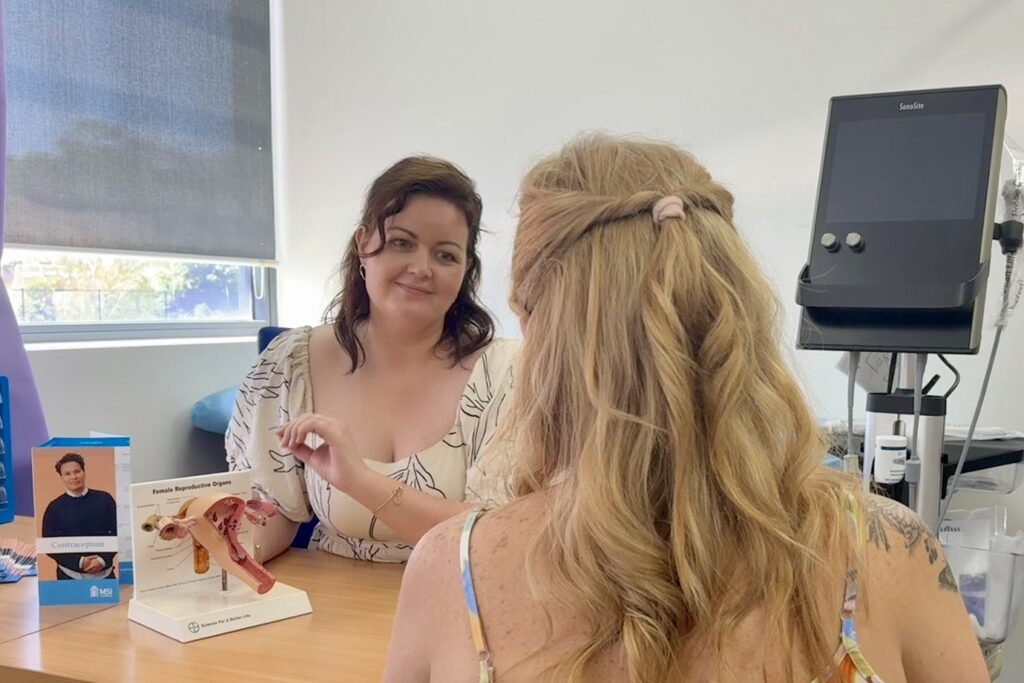With so much access to online advice and opinions, many young women are looking to social media for information about their reproductive health, rather than consulting a medical professional.
For Kara Manser, a Clinical Nurse Educator at MSI Australia, she’s seen this firsthand when her 17-year-old stepdaughter recently asked her for advice about taking the birth control pill.
Manser’s stepdaughter said she was wanting to go on the pill because she’d heard from TikTok that it was good for preventing acne.
Manser says the conversation was an “eye-opening moment”, as she realised just how influential people on social media can be towards young women, despite not holding medical credentials to give advice on reproductive health issues.
“She’s comfortable to come to me for advice, which is amazing,” says Manser about her stepdaughter. However, Manser says she was shocked to find out that her stepdaughter“gets all of her gynaecological health advice–including what is the best form of contraception—from social media”.
“The disinformation and misinformation that’s out there for young women and men, around what [form of contraception] they should be looking into and what is actually going to be good for them is really scary,” says Manser, who notes that it’s important for these young people to have access to factual information and feel comfortable speaking with a medical professional.
Through her work with MSI Australia, Manser is an advocate for providing patients with a variety of resources to help make an informed decision on which contraceptive option is right for their individual circumstance.
“It’s not a one size fits all situation,” she says. “There are many options of contraception and many different types of people and body types and hormone levelsand side effects.”

Making an informed contraception choice
Most people in Australia use a form of contraception that relies on a routine, such as the contraceptive pill or condoms. While these options are popular and easily-accessible, there’s also the option for patients to use a long-lasting reversible contraception—commonly known as a LARC—which research has shown to be more effective in preventing unplanned pregnancy.
For example, a contraceptive implant has been shown to have a 99.9 per cent effectiveness in preventing pregnancy, compared to the progesterone only pill (POP), which is 93-99 per cent effective, or the male condom, which is 82-98 per cent effective.
While every form of contraception is different, there’s also “no perfect form of contraception”, according to Dr Tara Aston, who recommends that patients continue to try different forms until finding the right fit.
“You might try every single form of contraception until you find the right one,” she says, adding that some options need time to adjust with your body, so it’s important to not cease using them too quickly.
Working at MSI Australia, Dr Aston is a GP with a specific interest in sexual and reproductive health.
When making a contraception choice, she says it’s important to understand there’s a “significant duration of the reproductive life”, meaning that a woman is fertile from their first period until post-menopause, which is a time-frame that spans decades.
Considering this, Dr Aston tells her patients that, in those decades, using a LARC is going to be a more reliable form of contraception than options like condoms, or even simply tracking the reproductive cycle.
“[When] using those methods, you’ll probably have a slip up at some point, which is why considering a LARC is a significantly more robust option,” she says.
Every individual is unique
Dr Aston also tells patients to not base their decision about contraception solely on the experience of a friend or family member.
“I always like to encourage them not to make a decision based on other people’s experiences,” she says. “Your body is unique, and this contraception is unique, and let’s see if they work together.”
“People, especially on social media, are more likely to be vocal about the negative experiences they’ve had with contraception. What you don’t typically hear [is] people who have a wonderful experience with these devices.”
Being aware of this one-sided dialogue that can appear on social media and seeking the advice of qualified advice is especially important, Dr Aston says.
“A health professional has the appropriate training to analyse and interpret various studies or resources related to contraception.”
“Most have a wealth of experience in managing various side effects or trialling different methods and may be able to pinpoint the best option for you very quickly and can then help you out if you’re facing challenges with your choice.”
Looking to access safe sexual and reproductive health services and information? MSI Australia is a fiercely pro-choice, non-judgmental, holistic health provider, with specially trained clinicians ready to support.
An independent, non-profit organisation, it is Australia’s only national accredited provider of abortion, contraception and vasectomy services, and the country’s longest running provider of teleabortion. Find more information here.

